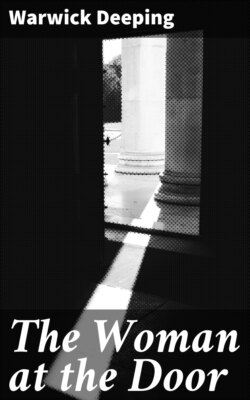Читать книгу The Woman at the Door - Warwick Deeping - Страница 5
На сайте Литреса книга снята с продажи.
3
ОглавлениеTable of Contents
Mr. Temperley, who was seventy-three years old, had lived so long and so intelligently, and through so many transformations that nothing surprised him. Mr. Temperley just chuckled. He had a fine head of white hair, and a skin that many a woman of five-and-thirty might envy. In fact, he was a handsome, stately and jocund old gentleman, with nothing dusty or documental about him.
Mr. Temperley had dined and was reading The Times in his library when a maid came in with a card on a salver.
“A gentleman from the Chequers, sir, wants to know whether you could give him an appointment for to-morrow morning.”
“What sort of a gentleman, Mary?”
“In knickerbockers, sir, and without a hat.”
Mr. Temperley chuckled, picked up the card and read it.
Obviously, a cultivated person both as to clothes and club, for in these days the gent le world went shabby. Mr. Temperley liked his glass of port and his dash of colour. He wore it in his tie, a gay cerise, also a black velvet coat in the evening. But, Mr. Temperley, being seventy-three, did not temporize with life; the little that was left of it he liked brisk and bracing. He was completely frank in his philosophy—“It’s a good world, even at seventy-three.—I’m not clamouring for my coffin.”
“Show the gentleman in, Mary. I’ll see him now.”
These two men had not been together for more than a minute when they were perfectly at ease with each other. Luce, offered a glass of port, refused it gently, but asked to be allowed to smoke a pipe. They had their feet to the fire. Luce, filling a pipe, confessed that he considered it very courteous and kind of Mr. Temperley to admit a perfect stranger into his house at such an hour, and on business. Mr. Temperley twinkled bright eyes at him, and also filled a pipe. Not at all. Mr. Temperley’s interest in life was almost that of a vigorous child. The unexpected was ever the most piquing.—And what, exactly was Mr. Luce’s business?
Luce looked at the fire, a wood fire piled against an old fireback.
“Too hot for you, Mr. Luce?”
“No.”
“November likes its fire—even in April. Well——?”
He lit a paper spill at the fire, and held it to the bowl of his pipe.
“I understand that you can tell me about the old signal tower on Brandon Heath.”
“The signal tower?”
“Yes, I stumbled on it this afternoon.... A unique sort of place. I confess it gave me a thrill.”
Mr. Temperley gave him a quick, birdlike look. He might be seventy-three, but he understood that sort of thrill. As a Surrey worthy, and one of its shrewdest archæologists, he could grow excited over a piece of flint, or the vague swell of an old vallum. O, yes, he could give Mr. Luce the information he desired. According to the records there had been eight such stations between Whitehall and Portsmouth. They had been built as naval signal stations in 1795. Each had been staffed by a lieutenant, a midshipman, and two sailors. The stations? Yes, Putney Heath, Brandon, Netley, Hascombe, Blackdown, Beacon Hill, Portsdown. Mr. Temperley was of the opinion that not all the stations had been towered. It had depended on the natural altitude of the site. And was Mr. Luce writing a book on the subject?
Luce smiled at the fire.
“No. I do write books—occasionally. And the Brandon tower is empty?”
Mr. Temperley crinkled up his eyes.
“Yes. We let it off to a fellow named Ballard, a farmer. One of his labourers and his family lived there. But we had a difference of opinion with Ballard. He had a yearly lease, and we did not renew.”
“So, the place is habitable?”
“In a sense,—yes.”
“Would you let it or sell it?”
Mr. Temperley drew in his legs and sat up in his chair.
“To you?”
“Yes.”
“But,—my dear sir!”
And then after contemplating for a moment his visitor’s frank and tranquil face, he began to divine the pleasant unusualness of Luce and his whimsies.
“You mean, you want solitude?”
Luce smiled at him.
“I happen to be built that way. And there is so little solitude left to us. Even the sky.”
Mr. Temperley nodded.
“Aeroplanes, mechanical blow-flies. But hadn’t you better view the place?”
“I should like to.”
“I have the key in my office. Also, may I remind you that—the domestic details—would be rather difficult.”
“Water?”
“Yes, there is a well. But no road, hardly a trackway. No shops nearer than ours.”
“How very—restful,” said his visitor.
Mr. Temperley’s pipe had gone out. He relit it. He was enjoying the occasion.
“Well, you would not be worried with visitors; but, unless you propose to be your own staff?”
“That,” said Luce quietly, “would be the exact situation. I happen to be one of those perverse people who try to penetrate—reality. The top of a Babylonian tower—and the stars! Quite absurd, of course, but the absurd and fantastic qualities—of the ultimate reality.”
Mr. Temperley’s white head seemed to catch the firelight.
“Yes,—I get you. Ascending into heaven—shall we say, but without the smell of petrol! Very crude and limited things, aeroplanes, after all. Well, I dare say we could let you the tower. If it had not been so devilishly remote, I expect some practical person would have pulled it down years ago and used the bricks to build—pigsties. But I think you had better have a look at its interior.”
Luce said quietly, “I will.”
